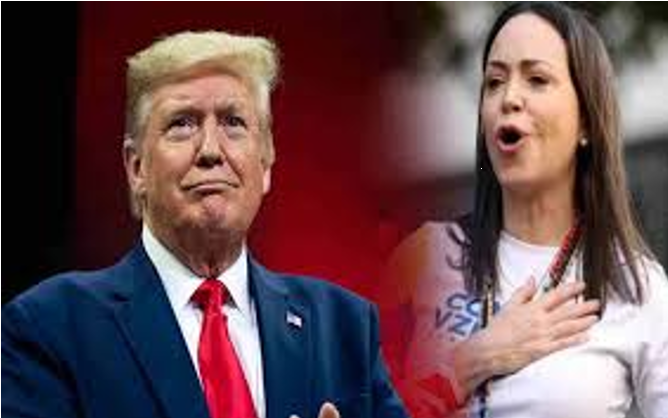By: Emanuel Adil Ghouri
The 2025 Nobel Peace Prize has been awarded to Venezuelan opposition leader María Corina Machado for her “tireless efforts to promote democratic rights and her struggle to achieve a peaceful transition from dictatorship to democracy,” the Royal Swedish Academy of Sciences announced during a ceremony in Oslo.
This year’s Nobel Peace Prize saw 338 nominations, including 244 individuals and 94 organizations, according to the Nobel Committee. The nomination process closed on January 31, 2025.
While the award was celebrated as a victory for democracy and human rights in Venezuela, the decision also reignited global discussion around former U.S. President Donald Trump, who publicly expressed his belief that he was the “most deserving” candidate for this year’s Nobel Peace Prize.
Trump’s Absence from the 2025 Nominations:
Donald Trump’s name was not included among the 338 official nominees. Analysts point out that the nomination period had already ended on January 31, while Trump took office again on January 20, leaving little time for formal consideration.
Additionally, his open campaigning for the Nobel Prize—a rarity among world leaders—was viewed by some experts as counterproductive.
The Nobel Committee emphasized that the prize “is awarded based on merit and not under any political or media pressure.” The committee further clarified that decisions are not altered at the last minute, even in response to major diplomatic developments.
In 2009, Trump had similarly voiced his wish to receive the Nobel Peace Prize but did not make the nomination list that year either.
María Corina’s Tribute to Trump:
Interestingly, upon receiving the prize, María Corina Machado acknowledged Trump’s influence in her country’s struggle for democracy. In her acceptance statement, she said:
“I dedicate the Nobel Prize to the oppressed people of Venezuela and to President Trump, who played a decisive role in our freedom movement.”
Her comments drew mixed reactions globally, with supporters praising the acknowledgment of Trump’s diplomacy, while critics questioned whether political endorsement should feature in such a prestigious ceremony.
Debate Over Trump’s Global Peace Role:
Despite the Nobel Committee’s stance, Trump’s supporters argue that his recent peace initiatives have been exceptional. During his latest term, Trump reportedly played a mediating role in several high-stakes conflicts:
. Defusing tensions between Pakistan and India, both nuclear-armed nations.
. Facilitating negotiations that helped avert a wider Iran–Israel confrontation.
. Pushing forward peace talks to de-escalate the ongoing Russia–Ukraine war.
. Backing a ceasefire deal between Hamas and Israel, which ended months of devastating conflict in Gaza.
According to regional observers, the Gaza war had claimed over 46,700 lives in the past 15 months, including 18,000 children, before a ceasefire was reached. Human rights organizations believe the actual toll could be even higher.
Analysts credit Trump’s diplomatic pressure on regional actors for helping prevent the conflict from spilling into a larger Middle Eastern war — a move some experts described as “the most significant peace intervention in recent decades.”
White House Reaction and Political Undercurrents:
Following the Nobel announcement, the White House expressed disappointment over the decision.
White House Communications Director Steven Cheung wrote on social media platform X (formerly Twitter) that:
“President Trump has been making peace deals around the world, ending wars, and saving countless lives. The Nobel Committee has once again shown that political bias outweighs genuine peace efforts.”
Cheung described Trump as a “humanitarian leader with the willpower to move mountains,” suggesting that his global peace agreements may yet earn him recognition in the future.
Political observers, however, note that the strained relationship between Trump and Western institutions—which he has often accused of elitism and unfairness—may have influenced the perception of his candidacy.
Experts suggest that if Trump’s recent peace initiatives, particularly in the Middle East and Eastern Europe, prove to be durable and effective, he could emerge as a strong contender for the 2026 Nobel Peace Prize.
For now, the Nobel Committee’s decision underscores its commitment to recognizing long-term democratic struggle over short-term diplomacy. Yet, Trump’s exclusion has sparked renewed debate about the political nature of the Nobel Peace Prize—and about what truly defines a peacemaker in the modern world.


